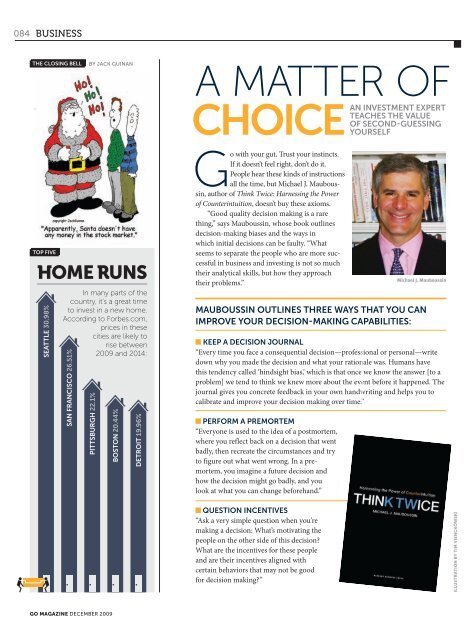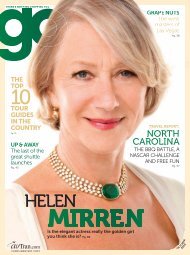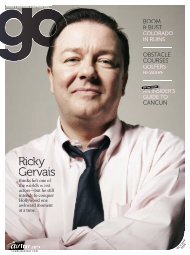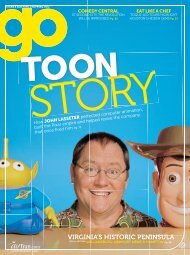Create successful ePaper yourself
Turn your PDF publications into a flip-book with our unique Google optimized e-Paper software.
084 BUSINESS<br />
THE CLOSING BELL BY JACK GUINAN<br />
TOP FIVE<br />
HOME RUNS<br />
SEATTLE 30.98%<br />
In many parts of the<br />
country, it’s a great time<br />
to invest in a new home.<br />
According to Forbes.com,<br />
prices in these<br />
cities are likely to<br />
rise between<br />
<strong>2009</strong> and 2014:<br />
SAN FRANCISCO 26.51%<br />
PITTSBURGH 22.1%<br />
GO MAGAZINE DECEMBER <strong>2009</strong><br />
BOSTON 20.44%<br />
DETROIT 19.96%<br />
A MATTER OF<br />
INVESTMENT<br />
CHOICEAN<br />
Go with your gut. Trust your instincts.<br />
If it doesn’t feel right, don’t do it.<br />
People hear these kinds of instructions<br />
all the time, but Michael J. Mauboussin,<br />
author of Think Twice: Harnessing the Power<br />
of Counterintuition, doesn’t buy these axioms.<br />
“Good quality decision making is a rare<br />
thing,” says Mauboussin, whose book outlines<br />
decision-making biases and the ways in<br />
which initial decisions can be faulty. “What<br />
seems to separate the people who are more successful<br />
in business and investing is not so much<br />
their analytical skills, but how they approach<br />
their problems.”<br />
EXPERT<br />
TEACHES THE VALUE<br />
OF SECOND-GUESSING<br />
YOURSELF<br />
KEEP A DECISION JOURNAL<br />
“Every time you face a consequential decision—professional or personal—write<br />
down why you made the decision and what your rationale was. Humans have<br />
this tendency called ‘hindsight bias,’ which is that once we know the answer [to a<br />
problem] we tend to think we knew more about the event before it happened. The<br />
journal gives you concrete feedback in your own handwriting and helps you to<br />
calibrate and improve your decision making over time.”<br />
PERFORM A PREMORTEM<br />
“Everyone is used to the idea of a postmortem,<br />
where you reflect back on a decision that went<br />
badly, then recreate the circumstances and try<br />
to figure out what went wrong. In a premortem,<br />
you imagine a future decision and<br />
how the decision might go badly, and you<br />
look at what you can change beforehand.”<br />
QUESTION INCENTIVES<br />
“Ask a very simple question when you’re<br />
making a decision: What’s motivating the<br />
people on the other side of this decision?<br />
What are the incentives for these people<br />
and are their incentives aligned with<br />
certain behaviors that may not be good<br />
for decision making?”<br />
Michael J. Mauboussin<br />
MAUBOUSSIN OUTLINES THREE WAYS THAT YOU CAN<br />
IMPROVE YOUR DECISION-MAKING CAPABILITIES:<br />
ILLUSTRATION BY TIM VIENCKOWSKI
















